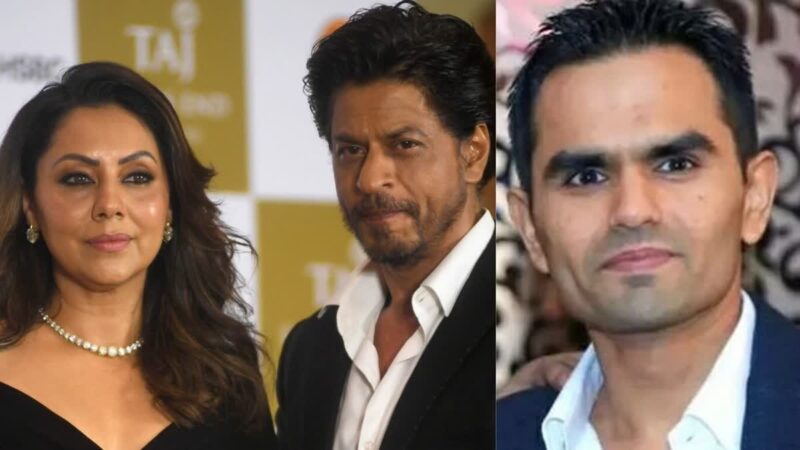
Former Narcotics Control Bureau (NCB) officer Samir Wankhede has filed a lawsuit in the Delhi High Court against Netflix, Shah Rukh Khan, and the producers of the web series The Bad Boys of Bollywood. This web series, which is linked to the Aryan Khan drug case, has portrayed Wankhede in a way he claims to be defamatory and damaging to his image.
Wankhede has demanded a compensation of ₹2 crore from Shah Rukh Khan, his wife Gauri Khan’s company, Red Chillies Entertainment, Netflix, and others involved in the production of the series. According to Wankhede, the compensation amount will be donated to Tata Memorial Cancer Hospital for the treatment of cancer patients.
Allegations in the Lawsuit
In his official statement, Samir Wankhede mentioned that he has filed a defamation suit in the Delhi High Court. The case involves a permanent and mandatory injunction, a declaration for relief, and damages against Netflix, Red Chillies Entertainment Private Limited (owned by Shah Rukh and Gauri Khan), and other related parties. This legal action was prompted by a false, malicious, and defamatory video segment aired as part of The Bad Boys of Bollywood, produced by Red Chillies and streamed on Netflix.
The lawsuit argues that the series creates a misleading and negative image of enforcement agencies fighting against drug abuse, which, in turn, weakens public trust in law enforcement institutions. Wankhede has further claimed that the portrayal of events in this series, particularly in its first episode, presents an exaggerated version of reality. In this episode, a character inspired by Samir Wankhede is seen outside a Bollywood party, searching for individuals who are allegedly involved in drug consumption.
Wankhede’s Claims Against the Series
Wankhede has alleged that The Bad Boys of Bollywood was deliberately created and presented to tarnish his reputation in a biased and harmful manner. He further emphasized that the timing of the series release was inappropriate, particularly when the case involving Samir Wankhede and Aryan Khan is still under judicial review in the Bombay High Court and the NDPS Special Court in Mumbai.
Wankhede’s statement also pointed out that a particular character in the series made an obscene gesture, specifically while chanting the slogan “Satyamev Jayate” (Truth Alone Triumphs), which is part of India’s national emblem. The character was shown making the middle finger gesture, which, according to Wankhede, is a serious violation of the provisions of the Prevention of Insults to National Honor Act, 1971. He stated that such an act could lead to legal consequences as it undermines national dignity.
Violation of Laws
According to the statement, the content of the series violates several provisions of the Information Technology Act and the Indian Penal Code (IPC), as it tries to harm national sentiments by using obscene and offensive material. Wankhede’s lawsuit seeks redress for the damages caused to his reputation and the potential harm to public trust in the law enforcement system.
Wankhede’s legal team is now urging the court to intervene and ensure that such damaging content is either corrected or removed, as it directly affects the integrity of his career and personal life. This lawsuit has brought to the forefront not only the specific grievances of Samir Wankhede but also raised larger concerns about how media representations, especially in popular web series, impact public perception and the credibility of individuals involved in high-profile cases.
Shah Rukh Khan and Netflix’s Involvement
Shah Rukh Khan’s involvement in this case comes from his production company, Red Chillies Entertainment, which is responsible for the production of The Bad Boys of Bollywood. While Shah Rukh Khan has not publicly commented on the legal action, his role as a producer of the series brings his attention to the concerns raised by Wankhede.
Netflix, being the streaming platform that aired the series, is also under scrutiny for hosting content that is alleged to be defamatory. Given the growing influence of web-based streaming platforms in India, this case highlights the power and responsibility of these platforms in shaping public opinion through their content.
The Broader Impact of the Case
This case has raised several important questions about the portrayal of law enforcement officers and public figures in popular media. The series, while dramatizing real-life events, has been accused of distorting facts and presenting them in a way that could damage the reputation of individuals like Samir Wankhede.
In recent years, India has seen an increase in the number of lawsuits filed by individuals who feel that their reputations have been damaged by media portrayals. These legal actions are not only focused on defamation but also on the protection of national symbols and sentiments, as reflected in the objection to the middle finger gesture shown in the series.
For Wankhede, this legal battle represents more than just personal vindication; it is a stand against what he perceives as the distortion of his role and work in the Aryan Khan drug case. The case also comes at a time when the Indian media landscape is under scrutiny for its portrayal of high-profile individuals and controversial cases.
A Step Toward Accountability
The outcome of this case could set a precedent for future media-related legal disputes in India. With the rise of streaming platforms and web series that often draw inspiration from real-life events, the question of how far media creators can go in fictionalizing true stories without causing harm to real individuals becomes increasingly relevant.
If the Delhi High Court rules in favor of Samir Wankhede, it could have a significant impact on the way media productions handle the portrayal of public figures, especially in high-profile cases. This could lead to more stringent standards for content creators to follow when depicting real-life individuals and events.
Wankhede’s Pursuit of Justice
In conclusion, Samir Wankhede’s lawsuit is not just about seeking compensation for the damages caused by the series. It is also about ensuring that individuals are held accountable for the portrayal of real-life events and people in a manner that respects their rights and dignity. The legal battle is likely to have broader implications for the Indian media industry, particularly when it comes to content that involves real-life personalities and controversial cases.
As the case moves forward, the legal community and the public will closely follow its progress. Wankhede’s efforts highlight the importance of protecting individual reputations in the age of digital media, where the line between fiction and reality often becomes blurred. Whether or not he receives the ₹2 crore he has demanded, this lawsuit is likely to serve as a key moment in the ongoing debate over media responsibility in India.


